MGT501 Business Environment: Ethics and CSR in Imperfect Competition
VerifiedAdded on 2023/04/20
|6
|1326
|205
Essay
AI Summary
This essay provides a conceptual understanding of business through economic principles, focusing on ethics and Corporate Social Responsibility (CSR) within the context of Market Power and Imperfect Competition. It emphasizes the increasing importance of CSR compliance for organizations across all market structures. The author reflects on personal experiences as an intern at Wesfarmers, observing the practical application of CSR and customer satisfaction strategies in a monopolistic market. The essay explores the relationship between CSR, market share, and competitive advantage, particularly in imperfectly competitive markets where firms may be tempted to engage in unethical practices to gain an edge. Government intervention in essential sectors like electricity and railway to protect the public from fraud and overcharging is also discussed. The author aims to enhance their understanding of how external environmental factors affect business profitability and plans to gain practical experience through internships to complement academic knowledge.
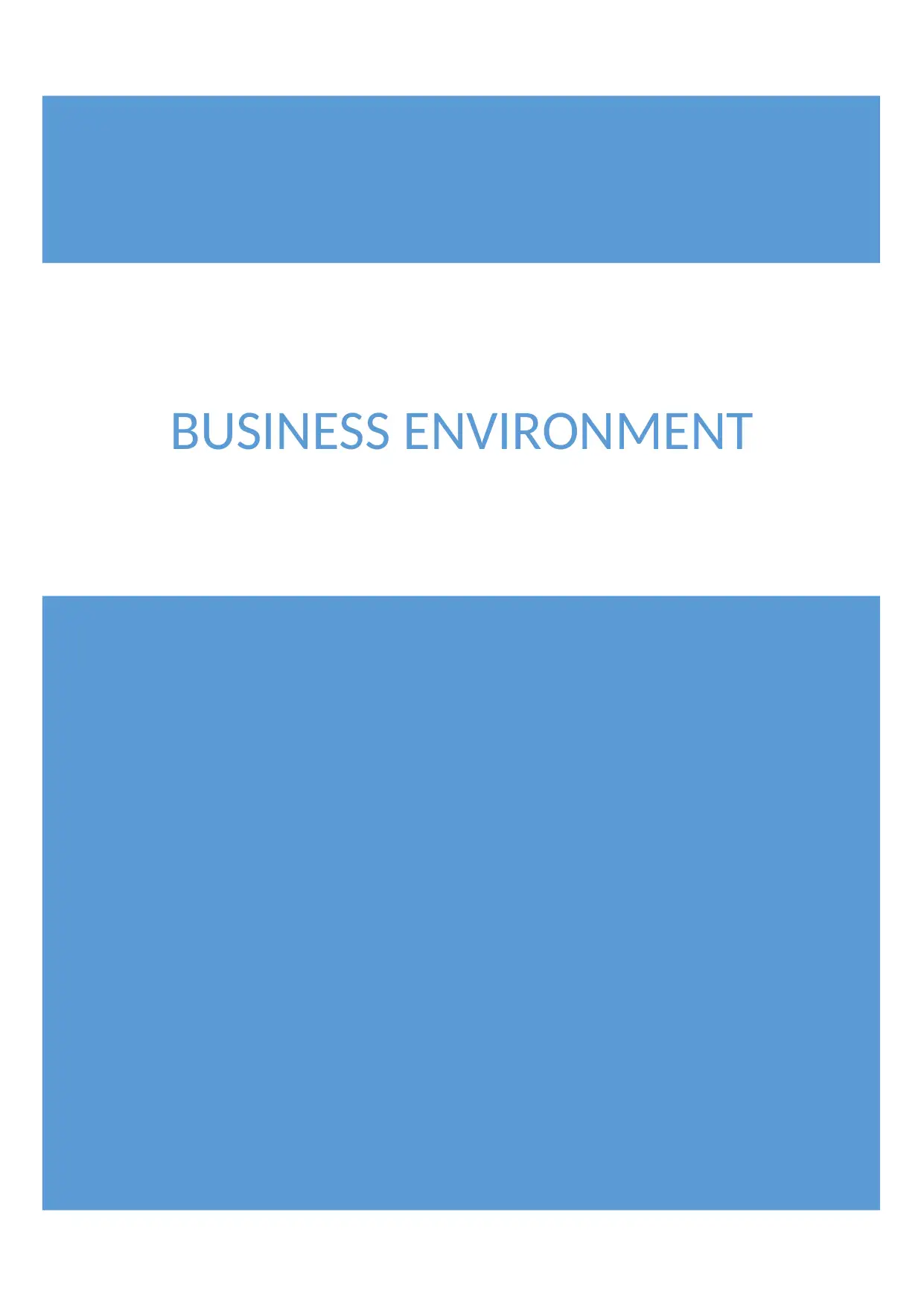
BUSINESS ENVIRONMENT
Paraphrase This Document
Need a fresh take? Get an instant paraphrase of this document with our AI Paraphraser
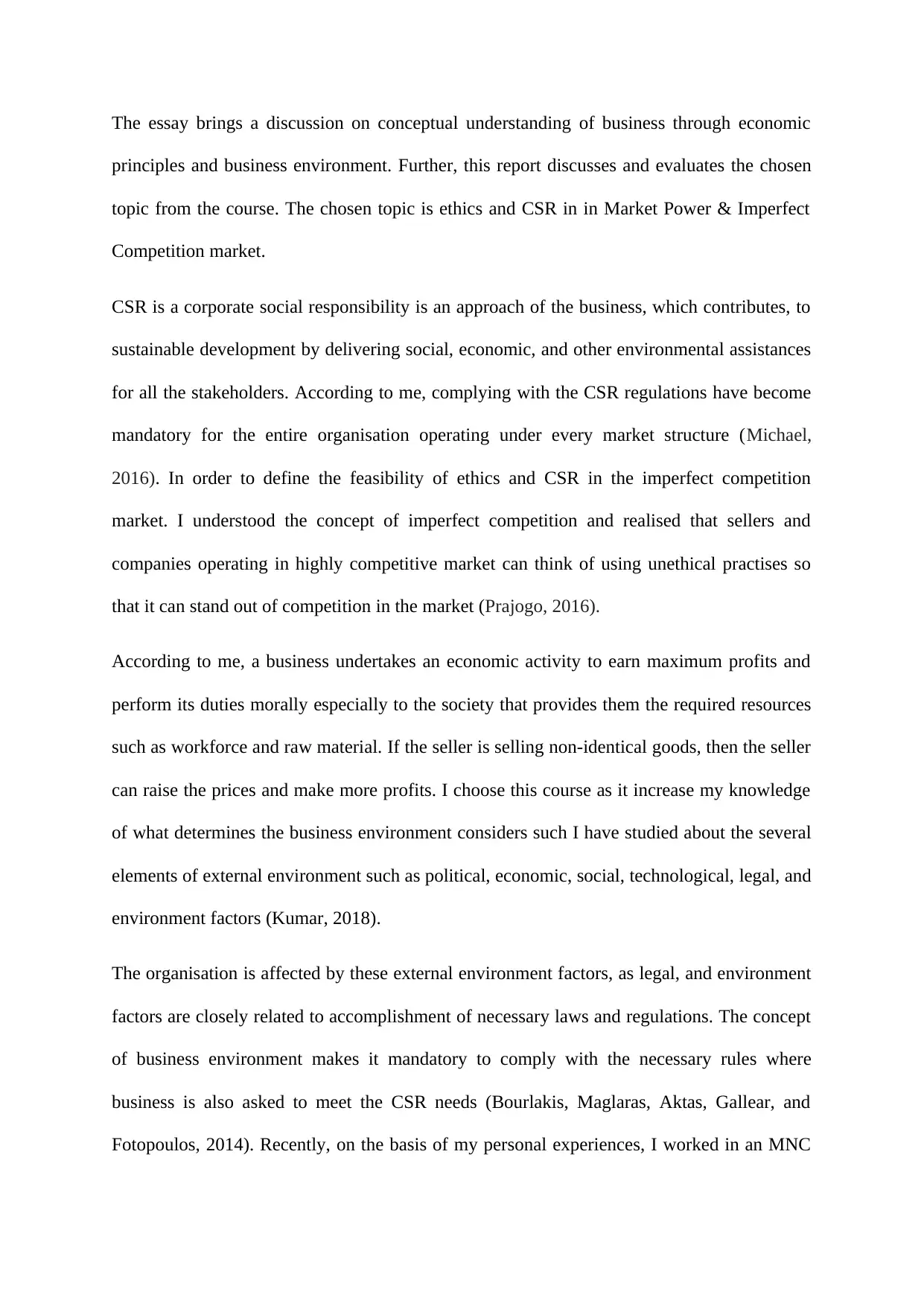
The essay brings a discussion on conceptual understanding of business through economic
principles and business environment. Further, this report discusses and evaluates the chosen
topic from the course. The chosen topic is ethics and CSR in in Market Power & Imperfect
Competition market.
CSR is a corporate social responsibility is an approach of the business, which contributes, to
sustainable development by delivering social, economic, and other environmental assistances
for all the stakeholders. According to me, complying with the CSR regulations have become
mandatory for the entire organisation operating under every market structure (Michael,
2016). In order to define the feasibility of ethics and CSR in the imperfect competition
market. I understood the concept of imperfect competition and realised that sellers and
companies operating in highly competitive market can think of using unethical practises so
that it can stand out of competition in the market (Prajogo, 2016).
According to me, a business undertakes an economic activity to earn maximum profits and
perform its duties morally especially to the society that provides them the required resources
such as workforce and raw material. If the seller is selling non-identical goods, then the seller
can raise the prices and make more profits. I choose this course as it increase my knowledge
of what determines the business environment considers such I have studied about the several
elements of external environment such as political, economic, social, technological, legal, and
environment factors (Kumar, 2018).
The organisation is affected by these external environment factors, as legal, and environment
factors are closely related to accomplishment of necessary laws and regulations. The concept
of business environment makes it mandatory to comply with the necessary rules where
business is also asked to meet the CSR needs (Bourlakis, Maglaras, Aktas, Gallear, and
Fotopoulos, 2014). Recently, on the basis of my personal experiences, I worked in an MNC
principles and business environment. Further, this report discusses and evaluates the chosen
topic from the course. The chosen topic is ethics and CSR in in Market Power & Imperfect
Competition market.
CSR is a corporate social responsibility is an approach of the business, which contributes, to
sustainable development by delivering social, economic, and other environmental assistances
for all the stakeholders. According to me, complying with the CSR regulations have become
mandatory for the entire organisation operating under every market structure (Michael,
2016). In order to define the feasibility of ethics and CSR in the imperfect competition
market. I understood the concept of imperfect competition and realised that sellers and
companies operating in highly competitive market can think of using unethical practises so
that it can stand out of competition in the market (Prajogo, 2016).
According to me, a business undertakes an economic activity to earn maximum profits and
perform its duties morally especially to the society that provides them the required resources
such as workforce and raw material. If the seller is selling non-identical goods, then the seller
can raise the prices and make more profits. I choose this course as it increase my knowledge
of what determines the business environment considers such I have studied about the several
elements of external environment such as political, economic, social, technological, legal, and
environment factors (Kumar, 2018).
The organisation is affected by these external environment factors, as legal, and environment
factors are closely related to accomplishment of necessary laws and regulations. The concept
of business environment makes it mandatory to comply with the necessary rules where
business is also asked to meet the CSR needs (Bourlakis, Maglaras, Aktas, Gallear, and
Fotopoulos, 2014). Recently, on the basis of my personal experiences, I worked in an MNC
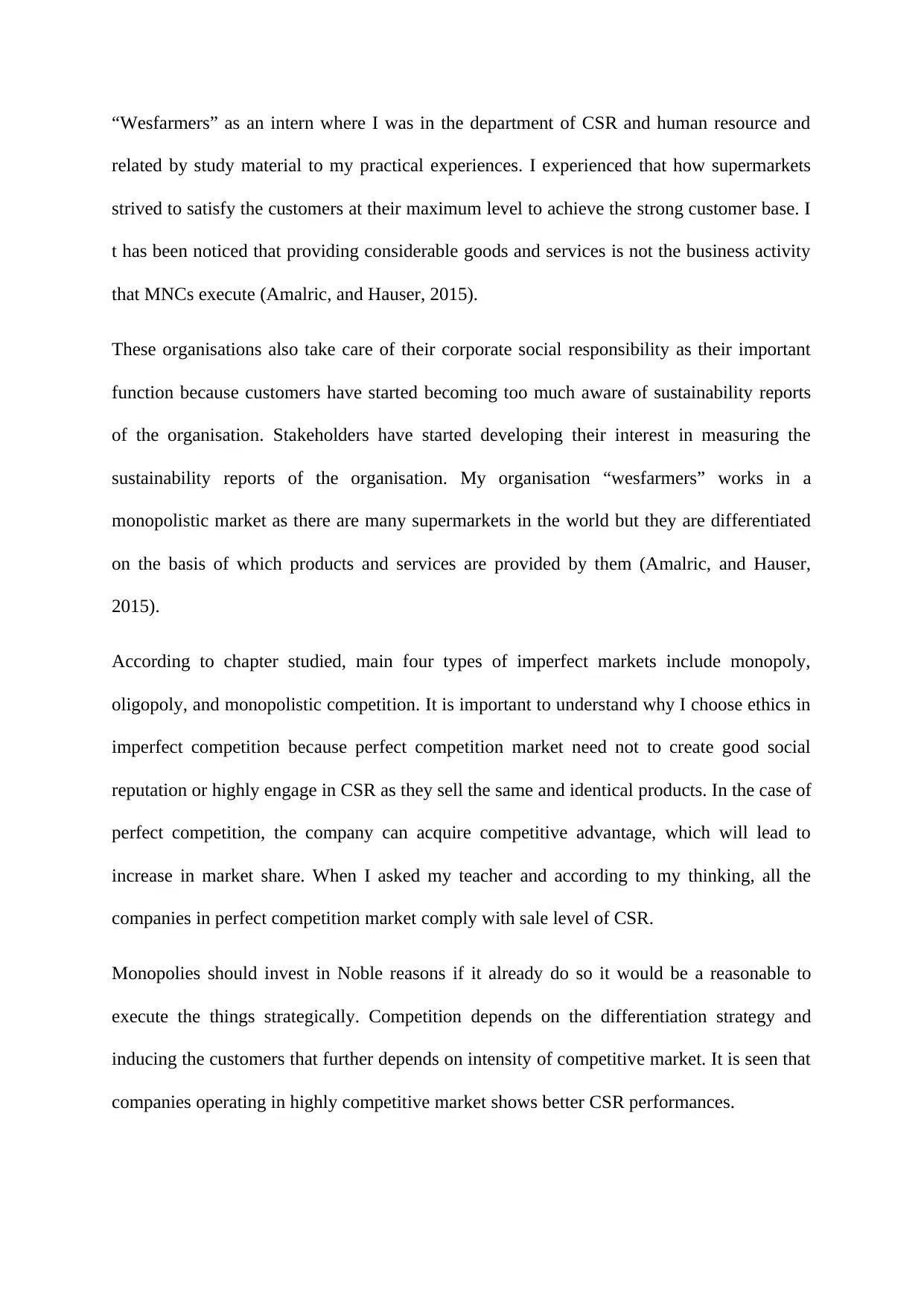
“Wesfarmers” as an intern where I was in the department of CSR and human resource and
related by study material to my practical experiences. I experienced that how supermarkets
strived to satisfy the customers at their maximum level to achieve the strong customer base. I
t has been noticed that providing considerable goods and services is not the business activity
that MNCs execute (Amalric, and Hauser, 2015).
These organisations also take care of their corporate social responsibility as their important
function because customers have started becoming too much aware of sustainability reports
of the organisation. Stakeholders have started developing their interest in measuring the
sustainability reports of the organisation. My organisation “wesfarmers” works in a
monopolistic market as there are many supermarkets in the world but they are differentiated
on the basis of which products and services are provided by them (Amalric, and Hauser,
2015).
According to chapter studied, main four types of imperfect markets include monopoly,
oligopoly, and monopolistic competition. It is important to understand why I choose ethics in
imperfect competition because perfect competition market need not to create good social
reputation or highly engage in CSR as they sell the same and identical products. In the case of
perfect competition, the company can acquire competitive advantage, which will lead to
increase in market share. When I asked my teacher and according to my thinking, all the
companies in perfect competition market comply with sale level of CSR.
Monopolies should invest in Noble reasons if it already do so it would be a reasonable to
execute the things strategically. Competition depends on the differentiation strategy and
inducing the customers that further depends on intensity of competitive market. It is seen that
companies operating in highly competitive market shows better CSR performances.
related by study material to my practical experiences. I experienced that how supermarkets
strived to satisfy the customers at their maximum level to achieve the strong customer base. I
t has been noticed that providing considerable goods and services is not the business activity
that MNCs execute (Amalric, and Hauser, 2015).
These organisations also take care of their corporate social responsibility as their important
function because customers have started becoming too much aware of sustainability reports
of the organisation. Stakeholders have started developing their interest in measuring the
sustainability reports of the organisation. My organisation “wesfarmers” works in a
monopolistic market as there are many supermarkets in the world but they are differentiated
on the basis of which products and services are provided by them (Amalric, and Hauser,
2015).
According to chapter studied, main four types of imperfect markets include monopoly,
oligopoly, and monopolistic competition. It is important to understand why I choose ethics in
imperfect competition because perfect competition market need not to create good social
reputation or highly engage in CSR as they sell the same and identical products. In the case of
perfect competition, the company can acquire competitive advantage, which will lead to
increase in market share. When I asked my teacher and according to my thinking, all the
companies in perfect competition market comply with sale level of CSR.
Monopolies should invest in Noble reasons if it already do so it would be a reasonable to
execute the things strategically. Competition depends on the differentiation strategy and
inducing the customers that further depends on intensity of competitive market. It is seen that
companies operating in highly competitive market shows better CSR performances.
⊘ This is a preview!⊘
Do you want full access?
Subscribe today to unlock all pages.

Trusted by 1+ million students worldwide
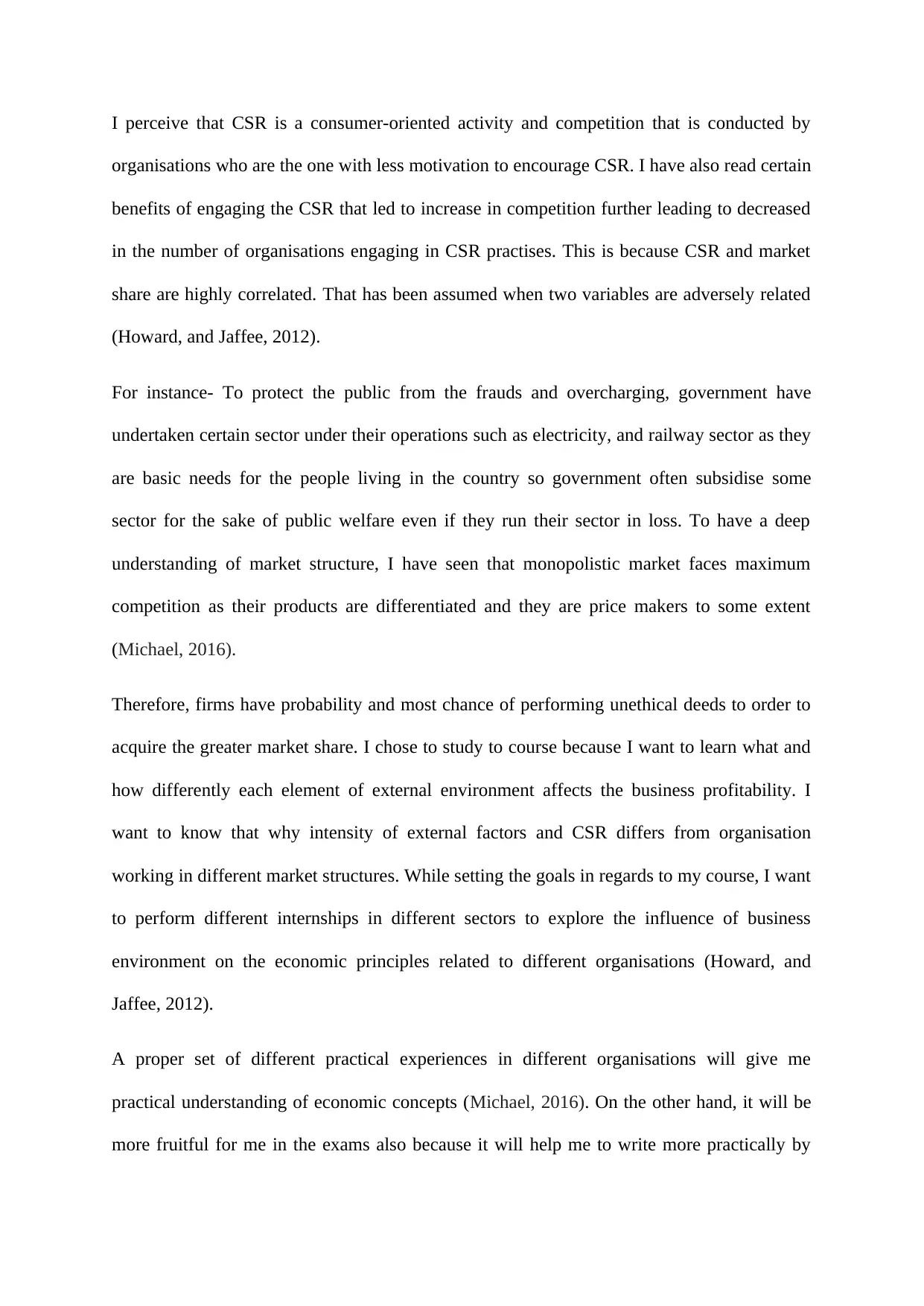
I perceive that CSR is a consumer-oriented activity and competition that is conducted by
organisations who are the one with less motivation to encourage CSR. I have also read certain
benefits of engaging the CSR that led to increase in competition further leading to decreased
in the number of organisations engaging in CSR practises. This is because CSR and market
share are highly correlated. That has been assumed when two variables are adversely related
(Howard, and Jaffee, 2012).
For instance- To protect the public from the frauds and overcharging, government have
undertaken certain sector under their operations such as electricity, and railway sector as they
are basic needs for the people living in the country so government often subsidise some
sector for the sake of public welfare even if they run their sector in loss. To have a deep
understanding of market structure, I have seen that monopolistic market faces maximum
competition as their products are differentiated and they are price makers to some extent
(Michael, 2016).
Therefore, firms have probability and most chance of performing unethical deeds to order to
acquire the greater market share. I chose to study to course because I want to learn what and
how differently each element of external environment affects the business profitability. I
want to know that why intensity of external factors and CSR differs from organisation
working in different market structures. While setting the goals in regards to my course, I want
to perform different internships in different sectors to explore the influence of business
environment on the economic principles related to different organisations (Howard, and
Jaffee, 2012).
A proper set of different practical experiences in different organisations will give me
practical understanding of economic concepts (Michael, 2016). On the other hand, it will be
more fruitful for me in the exams also because it will help me to write more practically by
organisations who are the one with less motivation to encourage CSR. I have also read certain
benefits of engaging the CSR that led to increase in competition further leading to decreased
in the number of organisations engaging in CSR practises. This is because CSR and market
share are highly correlated. That has been assumed when two variables are adversely related
(Howard, and Jaffee, 2012).
For instance- To protect the public from the frauds and overcharging, government have
undertaken certain sector under their operations such as electricity, and railway sector as they
are basic needs for the people living in the country so government often subsidise some
sector for the sake of public welfare even if they run their sector in loss. To have a deep
understanding of market structure, I have seen that monopolistic market faces maximum
competition as their products are differentiated and they are price makers to some extent
(Michael, 2016).
Therefore, firms have probability and most chance of performing unethical deeds to order to
acquire the greater market share. I chose to study to course because I want to learn what and
how differently each element of external environment affects the business profitability. I
want to know that why intensity of external factors and CSR differs from organisation
working in different market structures. While setting the goals in regards to my course, I want
to perform different internships in different sectors to explore the influence of business
environment on the economic principles related to different organisations (Howard, and
Jaffee, 2012).
A proper set of different practical experiences in different organisations will give me
practical understanding of economic concepts (Michael, 2016). On the other hand, it will be
more fruitful for me in the exams also because it will help me to write more practically by
Paraphrase This Document
Need a fresh take? Get an instant paraphrase of this document with our AI Paraphraser
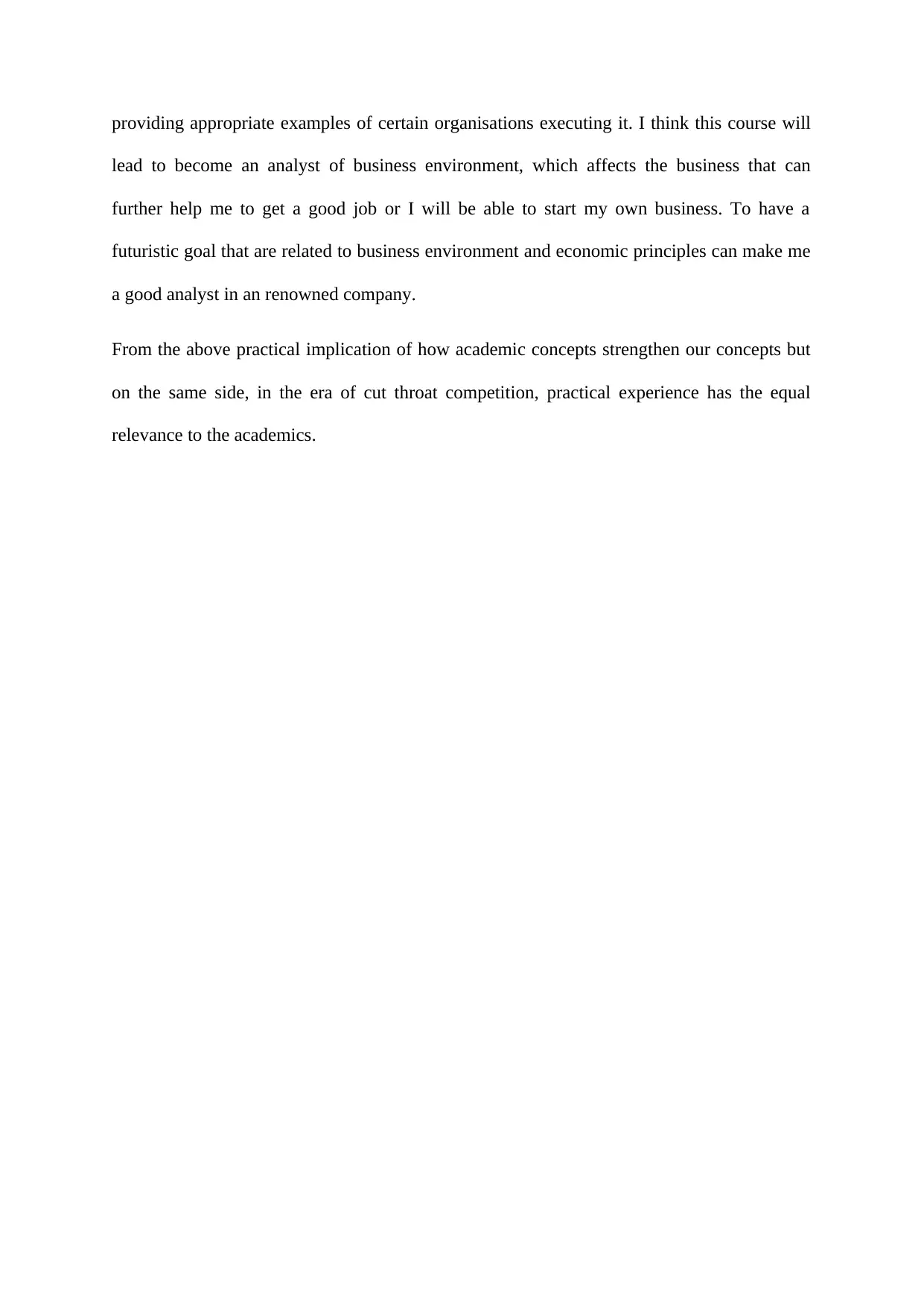
providing appropriate examples of certain organisations executing it. I think this course will
lead to become an analyst of business environment, which affects the business that can
further help me to get a good job or I will be able to start my own business. To have a
futuristic goal that are related to business environment and economic principles can make me
a good analyst in an renowned company.
From the above practical implication of how academic concepts strengthen our concepts but
on the same side, in the era of cut throat competition, practical experience has the equal
relevance to the academics.
lead to become an analyst of business environment, which affects the business that can
further help me to get a good job or I will be able to start my own business. To have a
futuristic goal that are related to business environment and economic principles can make me
a good analyst in an renowned company.
From the above practical implication of how academic concepts strengthen our concepts but
on the same side, in the era of cut throat competition, practical experience has the equal
relevance to the academics.
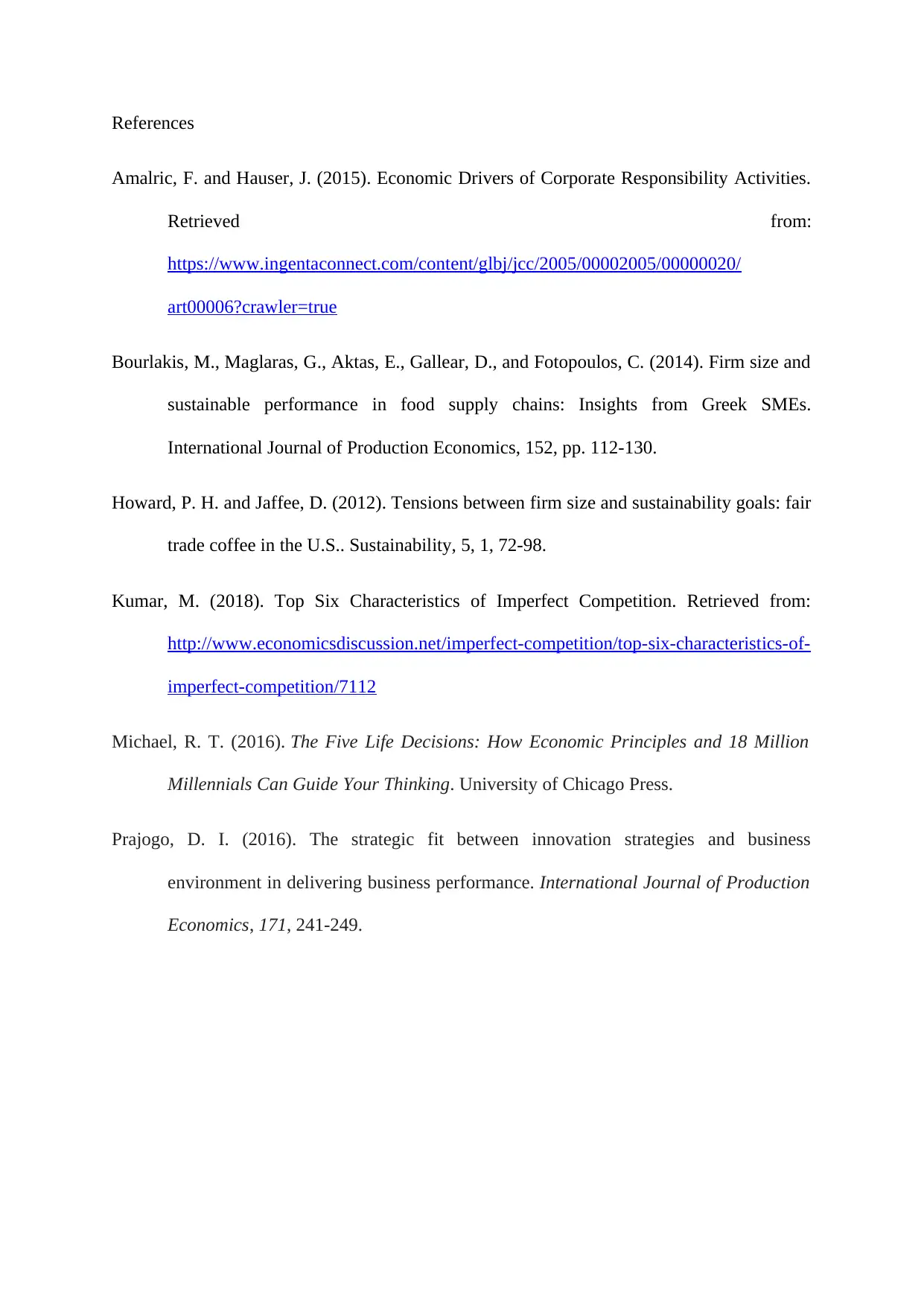
References
Amalric, F. and Hauser, J. (2015). Economic Drivers of Corporate Responsibility Activities.
Retrieved from:
https://www.ingentaconnect.com/content/glbj/jcc/2005/00002005/00000020/
art00006?crawler=true
Bourlakis, M., Maglaras, G., Aktas, E., Gallear, D., and Fotopoulos, C. (2014). Firm size and
sustainable performance in food supply chains: Insights from Greek SMEs.
International Journal of Production Economics, 152, pp. 112-130.
Howard, P. H. and Jaffee, D. (2012). Tensions between firm size and sustainability goals: fair
trade coffee in the U.S.. Sustainability, 5, 1, 72-98.
Kumar, M. (2018). Top Six Characteristics of Imperfect Competition. Retrieved from:
http://www.economicsdiscussion.net/imperfect-competition/top-six-characteristics-of-
imperfect-competition/7112
Michael, R. T. (2016). The Five Life Decisions: How Economic Principles and 18 Million
Millennials Can Guide Your Thinking. University of Chicago Press.
Prajogo, D. I. (2016). The strategic fit between innovation strategies and business
environment in delivering business performance. International Journal of Production
Economics, 171, 241-249.
Amalric, F. and Hauser, J. (2015). Economic Drivers of Corporate Responsibility Activities.
Retrieved from:
https://www.ingentaconnect.com/content/glbj/jcc/2005/00002005/00000020/
art00006?crawler=true
Bourlakis, M., Maglaras, G., Aktas, E., Gallear, D., and Fotopoulos, C. (2014). Firm size and
sustainable performance in food supply chains: Insights from Greek SMEs.
International Journal of Production Economics, 152, pp. 112-130.
Howard, P. H. and Jaffee, D. (2012). Tensions between firm size and sustainability goals: fair
trade coffee in the U.S.. Sustainability, 5, 1, 72-98.
Kumar, M. (2018). Top Six Characteristics of Imperfect Competition. Retrieved from:
http://www.economicsdiscussion.net/imperfect-competition/top-six-characteristics-of-
imperfect-competition/7112
Michael, R. T. (2016). The Five Life Decisions: How Economic Principles and 18 Million
Millennials Can Guide Your Thinking. University of Chicago Press.
Prajogo, D. I. (2016). The strategic fit between innovation strategies and business
environment in delivering business performance. International Journal of Production
Economics, 171, 241-249.
⊘ This is a preview!⊘
Do you want full access?
Subscribe today to unlock all pages.

Trusted by 1+ million students worldwide
1 out of 6
Related Documents
Your All-in-One AI-Powered Toolkit for Academic Success.
+13062052269
info@desklib.com
Available 24*7 on WhatsApp / Email
![[object Object]](/_next/static/media/star-bottom.7253800d.svg)
Unlock your academic potential
Copyright © 2020–2026 A2Z Services. All Rights Reserved. Developed and managed by ZUCOL.





